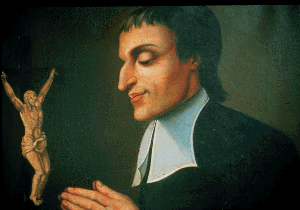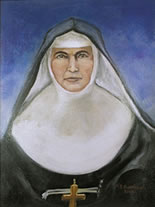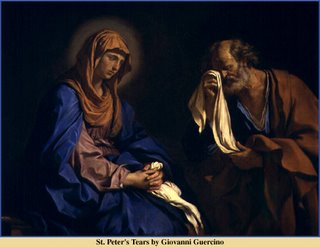
Louis Marie Grignon was born in the year 1673 in the town of Montfort, France to very devout parents Jean Baptiste and Jeanne Grignon. The young Louis spent much of his infancy on the family farm near the town of Montfort, where he helped out with the chores and became an eager learner of the stories told him of heroic Saints but most especially on stories involving the Blessed Mother.
From a very young age Louis showed extraordinary love for the Mother of God and longed to be her servant through the Church. Louis was also very different from many of his contemporaries as he loved to pray much and to offer little sufferings to God in the silence of his heart. He was not so much introspective as involved with God from his infancy, he grasped quickly the fundamentals of the spiritual life even as a young child which caused many to comment on his maturity and wisdom.
At the age of 12 years he left his farm and entered the Jesuit College of St Thomas Becket in Rennes where he excelled in his studies. It was also during this time of instruction and learning that Louis heart became touched by those who were living in impoverished circumstances. Though Louis was a very prayerful young boy he was not whimsical so he set about trying to alleviate and help the sufferings of the poor who were in his neighborhood as best he could in a practical manner.
Due to his studious and serious nature Louis caught the attention of a benefactor and through his help the young man was able to bring to fruition his longing to become a Priest, so Louis left to study at the prestigious Seminary of Saint Sulpice.
His parents were very proud of their erstwhile son and showered him with gifts before he embarked on his journey to Paris, during the journey Louis gave most of these gifts to the poor. Upon arriving though at Saint Sulpice Louis found that he did not have the required amount of money to board there, but undeterred Louis began living in boarding houses so as to continue his studies. Though Louis was very intelligent and his piety was noted by all, he was not elitist in nature and respected all people from various backgrounds, whether Prince or pauper Louis treated all with equality.
Following the practices that was thriving in his era Louis also began to practice severe acts of penance so much so that it would endanger his health, and lead to a spending a short time in hospital recuperating. Upon being released from hospital and still not in the best of health Louis very fortunately was offered a place within the Saint Sulpice.
This school was to alight a fierce love for the Blessed Mother that stayed with Louis for the rest of his life and though at times some of the aspects of Saint Sulpice could be stifling Louis chose instead not to become complacent in his studies nor in his private life as he continued to work hard and to also help the poor. Louis great love was to learn everything he could without becoming opinionated, to become knowledgeable about the Faith without falling into pride, to reach out to the poor without playing lord bountiful. Louis in essence longed for authenticity in everything!
It was in 1700 that Louis dream was fulfilled and he was Ordained into the Priesthood and his first Mass very aptly was at the altar of the Blessed Virgin in the Church that was in the grounds of Saint Sulpice.
Father Louis was sent to Saint Clement in Nantes as Priest. Filled with a zealous love of God and our Lady Louis would become frustrated that others did not necessarily share this same zeal and fire for God and Church. He longed for the mission field where he could preach to his hearts content and most especially spread the devotion and love he felt for our Blessed Mother. This love would set Louis on a course that not even he could have predicted, but of course this lay in the future.
It was in meeting Mme de Montespan a woman of dubious reputation who upon repenting of her loose lifestyle had completely renounced her life of sin for a life spent in loving God and her neighbour, through service to the poor. Through the intervention of Mme de Montespan Father Louis would become chaplain to the Hospital General where the homeless were housed in terrible conditions, Father Louis compassion was aroused as he saw the terrible conditions and abject poverty of the inmates and set about trying to rectify their terrible plight. As Louis was not one for compromising when things needed to be done he became disliked by those in authority at the hospital, being a practical man at heart Father Louis could not see how treating the inmates could benefit either them or the authorities. Unfortunately those in positions of authority decided they had enough of this meddling Priest and so Father Louis had to take his leave.
This unwillingness to compromise would lead Father Louis into troubled waters as upon arriving in Paris he offered his assistance to the chaplains at the Salpetriere which had been founded by St. Vincent de Paul. Through misunderstandings Father Louis was forced to leave this work and then found himself undergoing a short period where even his friends found him difficult which led to friction and soon Louis found himself friendless in a very large city.
During these difficult months Louis was led deeper and deeper into prayer as he reflected on the life of Christ and the Blessed Mother. It is thought that the beginnings of his book 'The Love of Eternal Wisdom' was begun during this difficult period. This time away gave Louis the time he needed to reflect on God's Will for his life and how he can fulfill his mission to serve God through the poor.
It was here that the poor intervened for many had come to love this very holy Priest and it was upon their request that Father Louis with the approval of the Bishop returned to the 'Hospital General' where he became Director and had the authority to see through his reforms to help make conditions more acceptable and more comfortable for the poorest of the poor. Through his hard work Father Louis would inspire many who came to know him and watch him at work with the poor who he loved without patronising them. Two of these would be young women who felt called to the Religious life, one was Marie Louise Trichet and Catherine Brunet these two ladies joined this very holy Priest in his mission to alleviate the sufferings of the poor and give them their due dignity. Later both women would become the first Sisters of the 'Daughters of Wisdom'.
Once again though Father Louis would be met with resistance as his reforms took affect and once again Father Louis was asked to leave the 'Hospital General'. So began another foray to try and spread the zeal he felt towards love of God and in living the Gospels in daily life. It seems Father Louis love of God was the problem as many other Priests became jealous of his obvious charisma and ability to lead others back to the Church.
Father Louis was at a loss he did not know which direction to take next as all doors seemed closed to him, but not the door of Rome and so Father Louis set off to see the Pope himself! He took this step not out of ego or self pity but as a step to find direction to where truly God Willed for him to be, and so he sought a meeting with the Pope.
After speaking with Pope Clement XI, where he confided his longing to be a missionary the Pope decided that Father Louis would serve France better by staying and so he made Louis Apostolic Missionary.
Upon returning to France and after a short retreat Father Louis met Father Leuduger a Priest who was held in very high esteem. During the following months Father Louis spent his time preaching to various dioceses about the need for more and more missionary workers even to his former home, Montfort. Through his efforts a soup kitchen was started up for Louis recognised that if his own people were suffering how could they help the rest of the world and stand by as their own communities went hungry?
Once again though Father Louis came into conflict as his inability to compromise forced him to leave the work started by Father Leuduger. Louis found he dealt better with people on a one to one basis and not as statistics, he loved the interaction of dealing with people from all walks of life without any feeling of condescension. So Louis continued forth in Montfort where he lived in a small community of two other men. Through all these troubles the one consistent fact is that though some had problems with Father Louis including his fellow Priests it became very evident that Louis had the heart of the poor who never forgot the love that this holy Priest gave them as he treated one and all as his betters. Put simply Father Louis was loved by the poor of each area he had worked in. Some spoke affectionately of this devout Priest as "the good Father from Montfort".
All through his life as a Priest it would be peppered with 'instances' as his fellow Priests became jealous of Louis ability to reach out and touch the heart of the people for love of God. It was through his love of the people that Father Louis began the enterprise of erecting a large monument to remind people of Jesus love for them on the Cross at Calvary. He began construction of the monument at Pontchateau with high hopes as people rallied around to see this awesome monument erected to honour Christ's suffering on the Cross at Calvary. It was here too though that once again jealousy raised its ugly head and Father Louis was told to stop construction on orders of the King the Bishop then refused to give his blessing and the whole project was called to a grinding halt.
One can stop and admire the sheer perseverance of this amazing man where no matter what he tried to do or how successful he was nothing he touched seemed to come to fruition not because Louis was flighty but because of the petty jealousies and rivalries of others. What is outstanding is the lack of bitterness shown by Father Louis who never uttered a critical word or spoke out of favour, and he never allowed any of this to stop him from preaching God's Word to those who needed to hear it. This was an extraordinary man amongst ordinary folk, who seemed to set off the wrath of his fellow Priests and some in authority and yet the poor embraced and loved him. Wherever Father Louis traveled and preached many came back to the Church while others embraced the Faith and were baptized into the Catholic Church just from listening to this holy and also totally honest Priest who only had their best interests at heart and was able to convey just how much God loved each one of His children.
During the last years of Father Louis life even though he still preached to whoever was willing to listen to him, he also did his most productive work when writing his thoughts into books which are still considered spiritual classics and are a treasure to the Catholic Church, to this very day.
Father Louis, overcame the jealousy of others, the pain of seeing his work destroyed. He endured the animosity of those in authority while retaining the love of the poorest of the poor. He overcame petty rivalries by keeping his eyes focused on spreading the Good News to all who would listen. He began soup kitchens to feed the poor, and established free schools for those who were to poor to educate their children. He began a new Order called 'Daughters of Wisdom' with the help of his two friends Marie Louise Trichet and Catherine Brunet. He even suffered attempts on his life with equanimity and compassion for his attackers.
Father Louis Marie de Montfort was a man amongst men and a Saint amongst Saints!
Father Louis Marie de Montfort died in the year 1716.
Saint Louis de Montfort was canonized in the year 1947 by Pope Pius XII.
Peace of Christ to ALL
Copyright © 2006 Marie Smith. All rights reserved.




